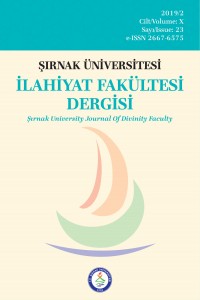Öz
Te’vil,
genel olarak İslâm düşüncesinin oluşum süreçlerinde en etkili olan kavramlardan
biridir. Dillerde yaşanan semantik değişim ve kaymalar kapsamında terim anlam
kazanan ve fıkıh usulü içerisinde ictihâdın aklî bir yöntemi olarak
değerlendirilen te’vilin fürû-i fıkhın şekillenmesinde önemli bir rol oynadığı
hususunda şüphe yoktur. Sözlük anlam itibariyle “dönmek, döndürmek, akıbet ve
mahiyet” gibi anlamlar içeren te’vilden terimsel olarak “bir delilden dolayı
lafzın zâhir anlamının terkedilerek muhtemel olduğu başka bir anlamda
anlaşılması ve yeni anlama göre fıkhî neticelere varılması” kastedilmektedir.
Bu anlamda ilke ve prensipleri usulcüler tarafından konan sahih te’vilin
mâhiyeti, gerektirici unsurları, şartları ve çeşitlerinin bilinmesi önem arz
etmektedir. Bu çalışmada te’vil bir fıkıh usulü kavramı olarak ele alınmış,
te’vilin mâhiyeti ile sıhhat ve butlan açısından çeşitleri ve müctehidlerin
te’vil vasıtasıyla füru-i fıkha dâir ortaya koydukları örnekler üzerinde
durulmuştur. Ancak yapılan te’villerin tamamının sahih kabul edilmemesi
sebebiyle süreç içerisinde usul eserlerinde “doğru, yanlış ve orta düzey”
anlamında “yakın, uzak ve mutavassıt” nitelikleriyle anılan te’vil çeşitleri
ortaya çıkmıştır. Bu durumda yapılacak olan te’vilde, Arap dilinin manâya
delâlet özelliklerinin ihlâl edilmemesi, varılan neticenin zaruriyât-ı
diniyyeye muhâlif olmaması ve ümmetin maslahatı çerçevesinde gerçekleşmesine
dikkat edilmesi gerekmektedir. Neticede te’vilin günümüzde de fıkhî bir
istinbât aracı olarak istifade edilebilecek bir kavram olduğu hususuna vurgu
yapılmıştır.
Anahtar Kelimeler
Kaynakça
- 1. Ahmet GÜL Şırnak Üniversitesi İlahiyat Fakultesi Tefsir Anabilim Dalı2. Yaşar ACAT Arap Dili ve Belâgatı3. Ahmet Özdemir İlahiyat Fakultesi Hadis Anabilim Dalı
Öz
Ta’wil
is one of the most influential concepts in the formation process of Islamic
thought in general. There is no doubt that the term ta’wil, which has gained
meaning in the context of semantic changes and shifts in languages and is
considered as a rational method of ijtihad in fiqh method, plays an important
role in shaping the fürû-‘i fiqh. Ta’wil contains “turning, rotating, fate and
nature” in terms of lexical meaning and it is meant “understanding the meaning
of the word in a sense that it is possible to abandon the apparent meaning of a
letter and reach fiqh conclusions according to the new meaning”. In this sense,
it is important to know the nature, necessity, conditions and types of the
authentic ta’wil which are laid down by the processors. In this study, ta’wil
is considered a concept of fiqh and it is focused on some examples of ta’wil’s
nature and quality and health and its kinds in terms of butlân (butlân is a
violation of a mandatory provision relating to the subject of a transaction),
sıhhat (sıhhat is a validity of a worship or a legal process) and some examples
of mujtahids by means of fiqh. However, due to the fact that not all of the ta’wils
are accepted as authentic, in the process, the types of ta’wils referred to as
“close, distant and mutavassıt” in terms of “right, wrong and medium”. In this
case, it should be paid attention that the characteristics of the meaning of
the Arabic language should not be violated, the obtained result should not be
contrary to the necessity of religion and that it should be realized within the
framework of the Ummah’s good affairs. As a result, today it is emphasized that
ta’wil is a concept that can be exploited as an instrument of fiqh today.
Anahtar Kelimeler
Kaynakça
- 1. Ahmet GÜL Şırnak Üniversitesi İlahiyat Fakultesi Tefsir Anabilim Dalı2. Yaşar ACAT Arap Dili ve Belâgatı3. Ahmet Özdemir İlahiyat Fakultesi Hadis Anabilim Dalı
Ayrıntılar
| Birincil Dil | Türkçe |
|---|---|
| Konular | Din Araştırmaları |
| Bölüm | ARAŞTIRMA MAKALELERİ |
| Yazarlar | |
| Yayımlanma Tarihi | 15 Aralık 2019 |
| Gönderilme Tarihi | 23 Temmuz 2019 |
| Kabul Tarihi | 12 Kasım 2019 |
| Yayımlandığı Sayı | Yıl 2019 Cilt: 10 Sayı: 23 |
Cited By
Yapay Zekâ Uygulamalarının E-Ticarette Kullanımı
International Journal of Management and Administration
https://doi.org/10.29064/ijma.1194949
Kutsal Metinlerde Hermenötik Yaklaşım ile Te’vil Olgusu
Şırnak Üniversitesi İlahiyat Fakültesi Dergisi
https://doi.org/10.35415/sirnakifd.1054904
Zâhir ve Bâtın Bağlamında Tevilin Sınırları/Fıkıh Tasavvuf İlişkisi -Taharet Örneği-
Marife Dini Araştırmalar Dergisi
https://doi.org/10.33420/marife.917030
Şırnak Üniversitesi İlahiyat Fakültesi Dergisi Creative Commons Atıf-GayriTicari 4.0 Uluslararası Lisansı (CC BY NC) ile lisanslanmıştır.


